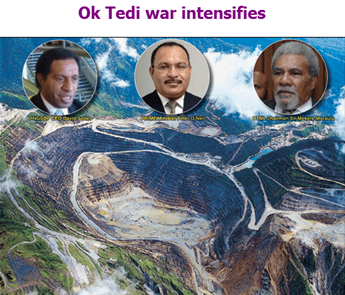
PORT MORESBY (Pacific Media Watch / Post-Courier / ABC Radio Australia): Senior journalists of Papua New Guinea’s government-run radio and television stations National Broadcasting Corporation (NBC) and Kundu 2 have been penalised, some removed from their positions, for allegedly reporting against the government, reports the Post-Courier.
Editor of Radio News Michael Asagoni, and executive producers of Kundu 2 Dick Sorariba and Mulai Robby, have been relieved of their positions and told to resume duties in NBC’s archive section, the Post-Courier said.
Experienced journalists Jerry Ginua and Wesley Manuai have also been questioned over the same issues.
The journalists wrote critical stories about Prime Minister Peter O’Neill and the Papua New Guinean government after a bill was passed in September nationalising the controversial Ok Tedi copper and gold mine in Western Province.
They also ran stories about an on-going corruption case where the Prime Minister and the government have been accused of illegally paying 70 million kina (NZ$ 32.5 million) to a law firm.
The government argued that the journalists reported biased stories favouring the opposition’s viewpoints.
According to the Post-Courier, Asagoni, Sorariba and Robby each received a letter from the managing director of NBC, Memafu Kapera last week, informing them that they were relieved of their positions effective from November 1.
Neither the journalists, the NBC management nor the Ministry of Communication were available for comment.
Ok Tedi background
The government takeover of the Ok Tedi mine has been a major story in the Papua New Guinean news media over the past few months.
The mine first made the headlines in 1984 when two billion tonnes of untreated mining waste were discharged into the Ok Tedi and Fly Rivers in the extreme west of Papua New Guinea, causing grave environmental damages that is still evident in the area.
By 2001, the owner of the mine, BHP Billiton, wanted to shut it down because of bad publicity.
The Papua New Guinean government, however, wanted to continue the mining operations because it needed the tax revenue.
BHP agreed to give away its ownership of the mine in return for a guarantee that it would not be sued for environmental damage, Professor Stephen Howes, director of the Development Policy Centre at Australia National University, explained on devpolicy.org.
The solution was to create the Papua New Guinea Sustainable Development Program (PNGSDP), a charitable trust registered in Singapore established in 2002.
The PNGSDP was left with 63 percent of the shares at the Ok Tedi mine, while the government owned the remaining 37 percent.
Two thirds of the development programme’s dividends were invested in a long-term fund promoting development in communities affected by the 1984 mining disaster, with one third spent on development projects throughout the country.
O’Neill takeover
After Peter O’Neill took over as Prime Minister of Papua New Guinea in 2012, tensions arose between the government and the PNGSDP, according to Professor Howes.
It seemed to culminate in late September when legislation was passed in Parliament that expropriated the mine without compensation to PNGSDP or local landowners, according to The Australian.
Parliament also removed the immunity of BHP Billiton and gave the government power to restructure the PNGSDP.
Former Prime Minister Mekere Morauta was sacked as the chairman of the PNGSDP.
In an interview with ABC, Professor Howes called the new bill an “enormous policy shift done in an enormous hurry”.
“What has happened here is an expropriation of the shares in the country’s largest company by the government. On the same day, legislation was passed to try to give the government control of SDP as well. It’s enormously wealthy. It’s got 1.4 billion US dollars in its long-term fund,” Professor Howes said.
He suggested the reputation of Papua New Guinea with foreign companies would be tarnished as a result of the government’s actions.
“The signal that this sends is that if you reach an agreement and you have a major falling out, that agreement may not be honoured, and your assets may be expropriated.
“You don’t want to be known as a country that goes about expropriating and trying to take over foreign companies,” the professor said in the ABC interview.
Corruption allegations
Professor Howes warned of possible government corruption resulting from the takeover, saying corruption was a “serious and widely acknowledged problem in the country” and that it was “implausible” the Papua New Guinean government would make better use of the Ok Tedi dividends than the PNGSDP.
Martyn Namorong, a Papua New Guinean political commentator, told Radio Australia’s Pacific Beat programme he believed the same as Professor Howes.
"There is the concern that money which has been kept in the long term fund for the benefit of the future generation of Western Province, will now be exposed to political manipulation," Namorong said.
Richard Zumoi, spokesman for the Ok Tedi affected landowners, said the legislation was like a slap in the face.
"It's just like stealing from the people of Western Province," Zumoi told Pacific Beat.
Former Prime Ministers Michael Somare and Mekere Morauta, fierce rivals of current Prime Minister Peter O’Neill, have been scathing of the government takeover.
Somare said the country’s reputation would be damaged, while Morauta sent a letter to O’Neill while still chairman of the PNGSDP, warning of “devastating social and economic consequences caused by the actions of the O’Neill government”.
The letter included a list of several charitable projects that had been closed because of the government takeover.
Among those were a village power and water supply project, a church-based health and education programme, and a scholarship scheme for “promising” students in Western Province.
The remarkable story of the nationalisation of PNG's largest mine
ABC interview with Professor Stephen Howes
PNGSDP's letter to Prime Minister Peter O'Neill
This work is licensed under a Creative Commons Attribution-NonCommercial 3.0 New Zealand Licence.




